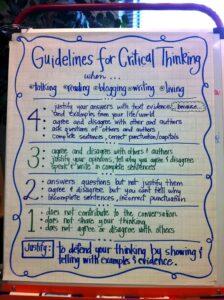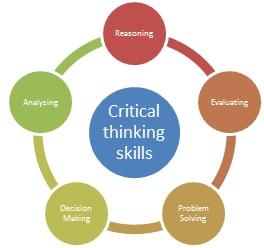
Critical thinking is a fundamental skill that is essential for success in every aspect of life. As homeschooling becomes increasingly popular, parents and educators are increasingly focused to teach critical thinking skills to their children. However, teaching critical thinking is not as simple as just giving students a set of instructions to follow. It requires a specific approach and methodology that fosters intellectual curiosity and encourages students to think independently.
Tips to Teach Critical Thinking
- Encourage Questions Encouraging children to ask questions is an essential step in developing their critical thinking skills. Parents can encourage their children to ask questions by asking open-ended questions, allowing them to explore and find their answers. In addition, parents can engage in discussions and debates that challenge their children’s views and encourage them to develop well-informed opinions.
- Teach Problem-Solving Skills Problem-solving skills are essential in developing critical thinking skills. Parents can teach their children problem-solving skills by presenting them with problems to solve and encouraging them to think of various ways to solve them. By teaching their children how to solve problems, they can learn how to think critically and apply the same skills in other areas of their lives.
- Use Real-World Examples Using real-world examples is an excellent way to teach critical thinking skills. Parents can use examples from their daily lives to help their children develop critical thinking skills. For instance, parents can ask their children to think critically about the news they watch, the books they read, or the advertisements they see.
- Teach Information Evaluation In today’s world, where information is readily available, teaching children how to evaluate the information they come across is crucial. Parents can teach their children how to evaluate information by asking them to determine the sources’ credibility and accuracy. In addition, parents can teach their children how to differentiate between facts and opinions and how to recognize bias in information sources.
- Teach Logical Reasoning Logical reasoning is a critical aspect of critical thinking. Parents can teach their children logical reasoning by encouraging them to think logically and systematically about problems they encounter. This skill is essential when it comes to making decisions, analyzing data, and evaluating arguments.
- Encourage Creative Thinking Encouraging creative thinking is an excellent way to foster critical thinking skills. Parents can encourage their children to think creatively by encouraging them to think outside the box and come up with unique solutions to problems. This skill can help children become more innovative and analytical in their thinking.
- Use Games and Puzzles Games and puzzles are an excellent way to teach critical thinking skills. Parents can use games and puzzles that require problem-solving, strategic thinking, and logical reasoning to develop their children’s critical thinking skills. This can include puzzles such as Sudoku, crosswords, and logic games.
- Emphasize Self-Reflection Encouraging self-reflection is an excellent way to teach critical thinking skills. Parents can encourage their children to reflect on their thoughts, feelings, and behaviors and encourage them to examine why they think and act the way they do. This skill can help children become more self-aware and better equipped to make informed decisions.
- Provide Opportunities for Decision-Making Giving children opportunities to make decisions is an excellent way to teach critical thinking skills. Parents can give their children small decision-making tasks and encourage them to think through the consequences of their actions. This skill can help children become more responsible and independent thinkers.
- Use Role-Playing Role-playing is an excellent way to teach critical thinking skills. Parents can use role-playing scenarios that require their children to think through problems and come up with creative solutions. This can help children develop problem-solving and decision-making skills while also developing their creative and analytical thinking skills.
Teaching critical thinking skills is essential for homeschooling. Parents can to use a combination of these methods to help their children develop critical thinking skills, and it is important to remember that these skills take time to develop. Parents should be patient and consistent in their efforts to teach critical thinking skills to their children.
By encouraging children to ask questions, teaching problem-solving skills, using real-world examples, teaching information evaluation, logical reasoning, encouraging creative thinking, using games and puzzles, emphasizing self-reflection, providing opportunities for decision-making, and using role-playing, parents can effectively teach critical thinking skills in homeschooling.
By providing children with the tools to think critically, parents can equip them to succeed in all areas of their lives, from academic success to personal relationships and beyond. Therefore, it is essential that parents prioritize teaching critical thinking skills in their homeschooling curriculum.
Keywords: critical thinking, homeschooling, problem-solving, logical reasoning, creative thinking, decision-making, self-reflection, role-playing, information evaluation, real-world examples.
Check out our Novel Writing Workbooks
Check out Little Tree Food Forest for articles on food forests and homesteading.
Check out FoodieScapes for articles on growing, fermenting and preserving food
Check out StoryScapes.World for articles on writing.
Subscribe to our newsletter to get information delivered to your inbox on homesteading, growing food, food preparation, travel, fishing, and more.











